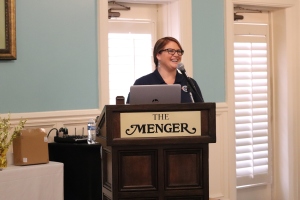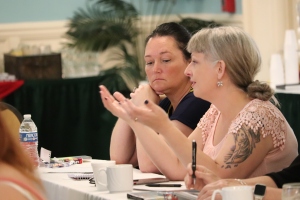By: Michelle Mondo
Here at Operation Homefront, financial literacy is a cornerstone of our programs. Recently, at a Hearts of Valor retreat in San Antonio, Texas, caregivers learned about budgeting from Critical Financial Assistance caseworker Tonya Cooper, also an accredited financial counselor. During one retreat session, she went through the steps of creating a budget and setting financial goals.
Because financial literacy is something everyone can use, we are trying something new. Each month, Operation Homefront will write a blog post dedicated to financial literacy. Tonya will be helping to come up with subjects and themes but if it catches on, we hope to hear your suggestions as well. We are going to touch on topics such as buying a car, raising financially literate children and much more.

Our first post is a Q&A with Tonya so readers can get to know her a bit and hear a summarized version of what she taught during the retreat. We’ve included a short bio at the end of the Q&A to learn more about her. And check back next month when we look at apps to save you money.
Tell us a little bit about yourself and what you do? I am a caseworker and I work in the Critical Financial Assistance department. As a caseworker, I assist wounded service members with their critical bills during a temporary hardship. I’ve always been interested in financial literacy, household budgeting, and personal finance. Having been in military culture for 13 years, I’ve been through PCS’s and deployments. I’ve experienced the unique needs a military family has financially. I realized as I was going through these struggles the families around me were going through the same struggles and no one really taught you how to tackle these challenges. I was helping friends with their budgets, I decided I wanted to do it professionally. I applied for a fellowship available for military spouses that allowed me to become an accredited financial counselor and now it has allowed me to work in this capacity—to be able to help service members with their finances, to promote financial literacy as education and I’ve also had the privilege of working at JBSA-Fort Sam Houston directly with active-duty service members to help them set financial goals.
Why is it so important that the families we serve in our programs get that kind of help? Financial literacy is so important because while we are serving the military community with the amazing programs that we have here at Operation Homefront, we also want to provide them with tools and resources to be successful in the future. For example, for every service member, we assist with critical financial assistance we provide them with a free resource for financial counseling that they can use for up to one year. The counselor will work with them to set financial goals and to create a realistic household budget.
In terms of finances, what are some of the biggest challenges you’ve seen for not only military families, but in general? Specific to the military community, PCSs are always one of the biggest challenges. Service members do receive allowances for relocation but are still paying out of pocket for so much. While uprooting the family, one major challenge is the spouse being unemployed or under-employed while enduring frequent relocations.
Budget discipline is also one of the biggest challenges that military families face but is certainly not unique to military culture. Formulating that discipline doesn’t come naturally to most people. Also, within any relationship, having one person as a saver and one person as a spender can make it difficult to find middle ground. Finances are one of the leading causes of divorce in the United States.
For those who want to get started how do they do that? There are only two concepts to utilize to improve your financial situation: you can either increase your income or reduce your expenses. Once mentally ready to take action, there are some simple steps to take.
So, once you have that mindset and you are ready, then what? Step one is setting goals and brainstorming. The exercises I designed for the Hearts of Valor caregiver retreat are designed to take you through that process step by step. It starts with brainstorming about how to increase income or reduce expenses.
Once you’ve refined your brainstormed goals, it’s time for step two—set SMART goals. SMART means your goals are Specific (what is the purpose?), Measurable (set criteria that define when goal is met), Achievable (is the goal realistic?), Relevant (the goal aligns with long-term vision), Timely (set a deadline to meet a goal).
Once you’ve set SMART goals, step three is assessing your expenses. Track your expenses for 30 days so you know what your budget looks like right now. You can’t identify ways to improve your budget unless you know exactly where it needs improving. One common budget leak is with food. It’s very likely that unless you closely track your expenses you are spending more on food than what you think you are. There is no way to commit to reducing food expenses if you don’t currently know what you are spending.
Step four is to take action to increase income or reduce expenses using the goals you set after you tracked your expenses. It is nearly always easier to reduce expenses than it is to increase income but be prepared to make some tweaks to your lifestyle to meet these goals.

During your Hearts of Valor session, you mentioned periodic expenses. Can you talk a little bit about that? So, in addition to tracking expenses for 30 days, I told the caregivers to pull out a physical calendar. I want you to go through month by month and write down those expenses that pop up every year but aren’t monthly. Examples are birthdays, holidays, vehicle tax, oil changes, professional dues, etc. These are all things you may not think about because they aren’t being accounted for when you tracked for 30 days. In creating this list, keep that calendar handy because there will always be something that will come up that you didn’t think about. The idea is that within a year you have a full description of those expenses and then you are going to work to fit those into your monthly budget in a separate fund. If your periodic expenses over a year add up to say $1,200. Divide that by 12 months and you want to set aside about $100 a month with the idea being that you don’t have to pull from your regular monthly expenses because you already have a fund set aside.
This can all feel like a lot coming at you at once. What do you tell people if they are feeling overwhelmed by money matters? When it comes to these steps, break them down into small pieces, step by step. When it comes to identifying what you want to do different financially, revert to this process. Start small, with one to two goals. The process itself tells you where to go. Find whatever worksheets work for you, download an app, there’s so many apps out there.
How do you boost people’s spirits or how do they stay positive if they can’t get over certain hurdles? I remind them that they don’t have to get this done overnight. It’s a process. I give them access to tools and resources they can utilize depending on the needs they have. It’s also worth trying to identify any underlying issues whether physical, emotional or mental. These are issues that will need to be identified and addressed so they can take positive control of their finances.
Tonya Cooper, AFC®, is a caseworker in Operation Homefront’s Critical Financial Assistance program. Since joining the Operation Homefront family, she has successfully advocated for over $300,000 in critical financial assistance for 200 veterans and their families, assisting with rent, utilities, auto payments and more during their times of temporary hardship. Having been a military spouse herself for 13 years and seeing the need for better financial education within the military community, she was inspired to become an Accredited Financial Counselor through FINRA’s AFCPE®Military Spouse Fellowship Program. She has also previously worked directly with military families at JBSA-Fort Sam Houston’s Military & Family Readiness center providing financial literacy education and one-on-one

